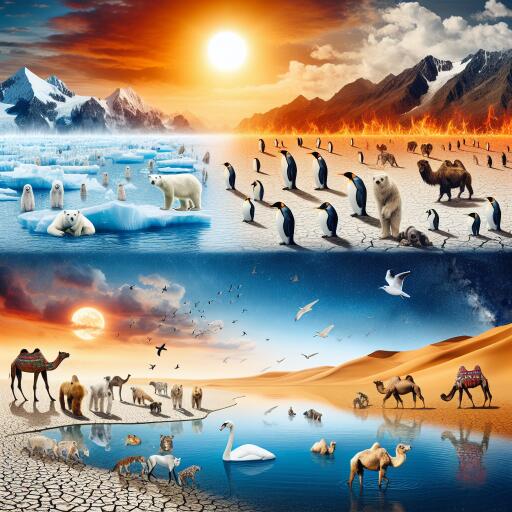
Climate Crisis: How Rising Temperatures Spell Trouble for Wildlife Populations – Today News Gazette
Recent investigations reveal a troubling trend: the increase in global temperatures is closely linked to declines in various wildlife populations. This critical environmental issue demands detailed exploration to fully grasp its far-reaching effects on biodiversity.
As human activities continue to contribute to global warming, primarily through greenhouse gas emissions, numerous species face mounting adaptation challenges. Findings suggest that even slight temperature upticks can lead directly to habitat destruction and diminished reproductive success. Notably, certain amphibian populations have shown sharp decreases, clearly tied to climate shift impacts.
Elevated temperatures disrupt ecosystems, transforming habitats that may no longer sustain indigenous flora and fauna. A prominent example is the northward migration of plant hardiness zones, compelling many animal species to abandon their habitual territories in search of livable environments. These shifts are evident as birds adjust their migratory patterns, deviating from traditional seasonal norms due to evolving weather patterns.
Although various species contend with the adversities posed by rising temperatures, some groups are particularly susceptible. Coral reefs, essential elements of marine ecosystems, are undergoing severe bleaching events directly related to heightened sea temperatures. It is estimated that around half of the global coral cover has been lost in recent decades, primarily due to the thermal stress inflicted by warming seas.
Furthermore, terrestrial animals such as polar bears face growing threats as they rely on stable ice platforms for hunting seals. With significant ice melt occurring during summer, their survival is increasingly at risk.
The decline of these species threatens not just individual organisms but also the balance of entire ecosystems. As competition for dwindling resources intensifies, smaller or weaker species edge closer to extinction, fundamentally altering food webs within interconnected environments.
The implications extend beyond the natural realm; human communities also bear the brunt of declining biodiversity, especially those reliant on natural resources for their livelihoods through agriculture or wildlife-centered tourism. Economically vulnerable communities may experience substantial hardships as crucial ecosystem services become compromised.
The increasing global temperatures represent an irrefutable threat, not only endangering specific vulnerable groups but also initiating widespread ecological transformations. These changes influence the complex interdependencies within nature and have economic and cultural ramifications for us all. Addressing these contemporary realities is imperative to safeguard the planet’s future well-being.





Leave a Reply